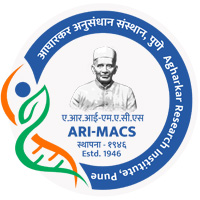Deposit of Microbial Cultures
MCM accepts deposit of microorganisms (archaea, bacteria and anaerobic fungi) belonging to Biosafety Level 1 and 2 categories, and DNA in the form of plasmids and whole metagenome libraries which are important for scientific and educational purposes. For microorganisms, each deposit is checked for purity, viability and identity, and then preserved for the long-term using standard and organism-specific specialized methods. For DNA deposits, depositor-specified gene markers are partially sequenced to ascertain the authenticity of such deposits. MCM is currently accepting deposits under two categories: General or public-access Deposit and Safe or restricted Deposit.
Please contact the curator in-charge (mcm.services@aripune.org) in advance for more than 10 deposits at a time.
General Deposit (Public access)
- Cultures deposited under this category are listed in the open MCM catalogue and are accessible to public for academic and scientific research. A nominal one-time fee is charged for depositing cultures under this section given that most deposits maintained at MCM require specialized handling. Depositors from outside India may require clearance from appropriate authority in their home country. MCM reserves the right to reject a request for deposit of culture. Unidentified cultures are not accepted for deposit under this category, unless otherwise agreed upon based on separate MoUs. Once accepted and accessioned by MCM, a culture cannot be withdrawn from the collection.
Safe Deposit (Restricted Access)
- Cultures can be deposited under this category only after an agreement has been signed by the depositor with MCM. Safe deposit cultures are neither listed in the MCM catalogue nor are accessible to anyone. These cultures can be accessed only by the depositor upon payment of required fee. Strict confidentiality and security are maintained in processing such cultures. There is a recurring annual fee for such deposits: Rs. 10,000/- for the first year and Rs. 5000/- per annum for subsequent years.
1.
Prospective depositor contacts MCM about the acceptability of the culture(s) before sending.
2.
Once MCM agrees to accept the microorganism(s) the depositor sends the culture(s) along with the properly filled and signed Form for deposit and a duly signed Material Accession Agreement
3.
Proper care should be taken in packing the cultures (slant or stab or plate) so that they are not damaged during transit. This is necessary to ensure safety of persons who may come in contact of the material. Culture tubes received in damaged condition are not processed by MCM.
4.
Cultures are processed for checking viability and purity. Viability testing of archaeal and bacterial cultures is determined usually within two working days, and for anaerobic fungi usually between 7 days to 4 weeks.
5.
If the culture is not pure or non-viable, the depositor is informed immediately.
6.
Pure and viable cultures are taxonomically authenticated using molecular methods and identified cultures are given an accession number by MCM and preserved.
7.
A sample of the preserved culture will be sent to the depositor along with Depositor’s check Form to ensure that the microorganism preserved at MCM conforms to the original. The depositor confirms authenticity of the culture by submitting the duly signed Depositor’s check form to MCM at the earliest but no later than 30 days.
8.
The certificate of availability with MCM accession number is issued by MCM to the depositor upon receipt of the duly signed Depositor’s check form or after 30 days, whichever is earlier.
- Submit deposit samples from official address (no private address).
- Pure microbial culture on Petri plate, slant or stab with completed form for deposit, proof of payment and duly signed MAA.
- Prompt return of the duly signed Depositor’s check form.
Fast growing microorganisms with no special growth requirements usually take 20-25 working days to complete the authentication and cryopreservation processes. However, it may take longer for slow growing microorganisms. The certificate of deposit is issued day after receiving duly signed Depositor’s check form.


